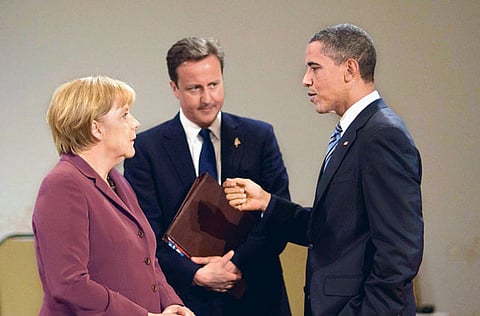Cameron urges commitment to aid
Countries fail to keep monetary pledges made at 2005 Gleneagles summit to help world's poorest nations

Londonl: David Cameron Friday night hit out at his fellow world leaders after the G8 dropped the promise to meet the historic aid commitments made at Gleneagles in 2005 from this year's summit communique.
European countries such as France, Germany and Italy are off track to meet their 2005 promises to increase aid to the world's poorest nations, and they led efforts Saturday to keep mention of Gleneagles out of the summit's final agreement.
Cameron said the credibility of such world summits was undermined by foot-dragging by the G8, having already warned last week that the summits were in danger of turning into talking shops.
"The Gleneagles G8 was important," he said. "Every-one remembers that moment when world leaders put money on the table and made promises. Now, Britain has stuck to its promises, and will stick to its promises under my prime ministership. It is frustrating that world leaders sign up to ideas and then do not deliver them; and we should make sure that happens."
At Gleneagles, leaders responded to the Make Poverty History campaign by pledging to double overseas assistance by 2010; the G8 said it would increase overall aid spending by $50 billion (Dh183.5 billion) by 2010, providing an extra $25 billion for the poorest nations in Africa. The Organisation for Economic Co-operation and Development in Paris said in its annual health check this year that less than half the money to Africa had been provided.
But the prime minister also faced criticism Friday after Downing Street admitted he had not fought to include in the summit text a reference to Gleneagles.
Millennium goals
In the past, Tony Blair and Gordon Brown insisted on G8 countries being reminded of their commitments, which were personally signed by world leaders. Cameron said that, as "the new kid on the block", he was now focusing on a different aid target, the UN's 2015 millennium development goals.
Silvio Berlusconi, the only leader at Gleneagles still in office, has cut Italy's aid budget, while France and Germany are only a quarter of the way to matching their pledges.
Friday night aid campaigners reacted angrily to the watering down of the Gleneagles agreement and expressed deep scepticism at a fresh G8 initiative to increase spending on maternal and early year health, being promoted as the breakthrough from this year's summit. Actor and campaigner Bill Nighy said: "Attempts to drop the $50 billion aid promise made at Gleneagles would be a betrayal of poor people and the millions who campaigned to make poverty history. Any creative accounting would be scandalous."
Patrick Watt of Save the Children said: "It is pretty extraordinary after all the fanfare that the promises are now quietly being shelved."
Downing Street was Friday night seeking to play down the significance of the dropping of any mention of Gleneagles from the communique, insisting that the self-monitoring process set up by the G8 last year would ensure promises were met.
But Douglas Alexander, the shadow development secretary, said: "Any attempt by G8 leaders to quietly drop any reference to the historic targets agreed under Tony Blair and Gordon Brown's leadership at the Gleneagles G8 in 2005 would be a betrayal of the world's poorest people who are bearing the brunt of the global economic crisis.
"It is one thing for David Cameron to make grand statements about global poverty. It is another to put in the hard graft to get other world leaders to keep their promises. Many people are questioning whether he is making any effort to ensure they are not dropped.
"It is bad enough that many countries have failed to meet their promises, but to drop them altogether would be utterly wrong." Canada's Prime Minister, Stephen Harper, announced $1.1 billion of funding for maternal, newborn and child health in poor countries, which would deliver "significant, tangible differences in the lives of the world's most vulnerable people"; the UN target is to reduce maternal mortality by 75 per cent, but it is currently the goal which is most off track.
Cameron said: "We are looking [at the UN goal of] maternal and child health. If we can save the lives of millions of mothers giving birth in the poorest countries, we can make a major difference."
Aid campaigners said that at a time of severe budgetary restraint there was little likelihood of any fresh money, and the extra aid for mothers and infants would be from existing budgets. Max Lawson of Oxfam said: "Leaders must not be allowed to shirk their responsibility to the world's poor.
"This year the headline is maternal health, last year it was food; every year we get a new G8 initiative. But with overall aid flatlining, they are just moving money around."
With the developed countries still reeling from the financial slump, do you expect them to keep their commitments to the developing nations? Which country can take the lead in delivering aid?
Sign up for the Daily Briefing
Get the latest news and updates straight to your inbox



